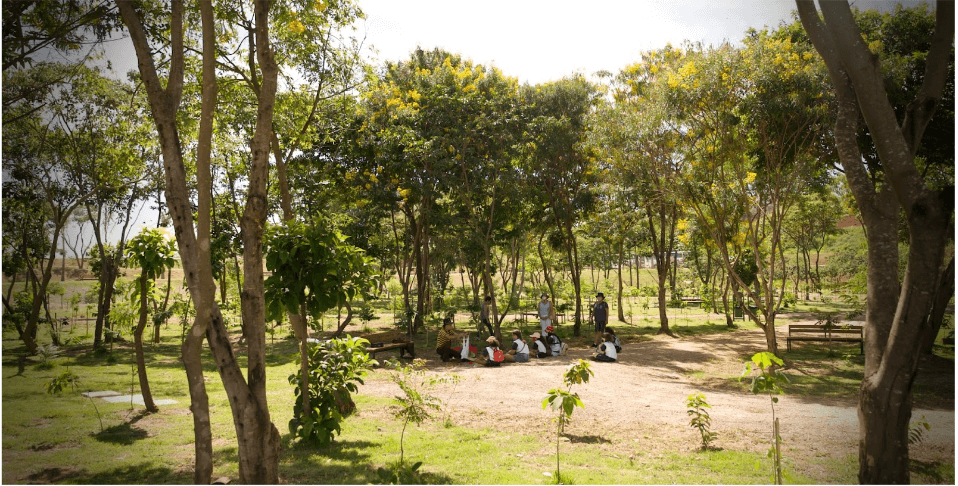A comprehensive 2021 United Nations report underscores the severity of Earth’s “triple environmental emergency”: climate change, biodiversity loss, and pollution (UN 2021). This interlinked crisis, often called a “poly-crisis,” weaves together multiple global challenges—including food and water scarcity, mass migration, epidemics, droughts, floods, and heatwaves—deeply affecting lives worldwide. Its impacts are particularly concerning for children, who are in a sensitive stage of development and are, therefore, among the most vulnerable to these threats. The poly-crisis also jeopardizes the essential services, policies, and institutions that support the well-being of children and their families. Moreover, children face an uncertain future as the ones who will live the longest with the consequences of today’s environmental crises. Alarmingly, over one in four deaths of children under the age of five is directly or indirectly linked to environmental hazards (WHO 2017).
In addition to climate change’s devastating effects, children are also experiencing another interconnected, less-discussed crisis: a drastic decline in access to and connection with the natural world. Particularly in urban areas, children are increasingly confined and have fewer free outdoor play and exploration opportunities. This disconnection from nature takes a heavy toll on their health and well-being. Brazilian Indigenous leader Ailton Krenak has argued that the root cause of today’s environmental crises lies in the Western world’s disconnection from the Earth—the very living system to which we belong (Krenak 2019).

Extensive research highlights the powerful benefits of access to nature for children’s healthy development. Time spent in nature strengthens key aspects of childhood—such as immunity, physical health, memory, active learning, creativity, and social skills—which are all essential to children’s overall well-being. The American Academy of Pediatrics, in partnership with the Alana Foundation, recently published “Guidance on Nature’s Benefits in the Development of Children and Adolescents,” which includes evidence-based insights on how connecting children with nature can support the physical and mental well-being of all children.
Traditional wisdom echoed across various cultures has long acknowledged the importance of a “nature-rich” childhood, and now science concurs: Children who engage in natural play are healthier, happier, and even demonstrate enhanced cognitive skills (Islam et al. 2020).
Beyond these physical and psychological benefits, a nature-rich childhood helps foster pro-environmental attitudes and behaviors. When children form a bond with the environment and see themselves as part of their natural surroundings, they are more likely to become adults who prioritize environmental protection (Chawla 2006).
Organizations like the WHO, UNICEF, and the International Union for Conservation of Nature emphasize the critical role of local and national governments in ensuring safe, accessible green spaces for all communities (Sugar 2021). However, not all children have the same access to these spaces, and many urban communities lack safe, accessible green areas, which disproportionately affects families in low-income neighborhoods. Bridging this gap is essential, as these green spaces provide a foundation for children’s connection to nature and for nurturing the values that will drive future climate action.

To address this disparity, initiatives such as the Urban95 project, a partnership between the Van Leer Foundation and the Alana Institute in Brazil, are helping bring nature to underserved neighborhoods. Urban95 creates “pocket parks,” or small natural play areas, in low-income urban areas where formal parks are scarce. These pocket parks ensure that all children, regardless of their socioeconomic background, have access to nature close to home. Involving parents and local community members in planning and designing these parks fosters a sense of ownership, ensuring these green spaces meet local needs.
Fostering children’s connection to nature is essential for their healthy development and for cultivating a generation dedicated to environmental stewardship and climate action. As children grow up with an appreciation for the natural world, they carry this respect and understanding into adulthood, shaping their choices and actions to benefit the planet. By nurturing this bond, we foster empathy, resilience, and a commitment to the Earth—qualities that will drive the climate action we so urgently need.


One Response
I love this concept of pocket parks! Thanks for sharing your work on this, Laís! The idea is a perfect fit with Ten Strands’ California Campaign for Outdoor Learning. Pocket parks would be a great asset for schools as they organize regular walking field trips in their nearby community. Where does Urban95 work? All in Brazil? Are there similar efforts here in California or other parts of the US?